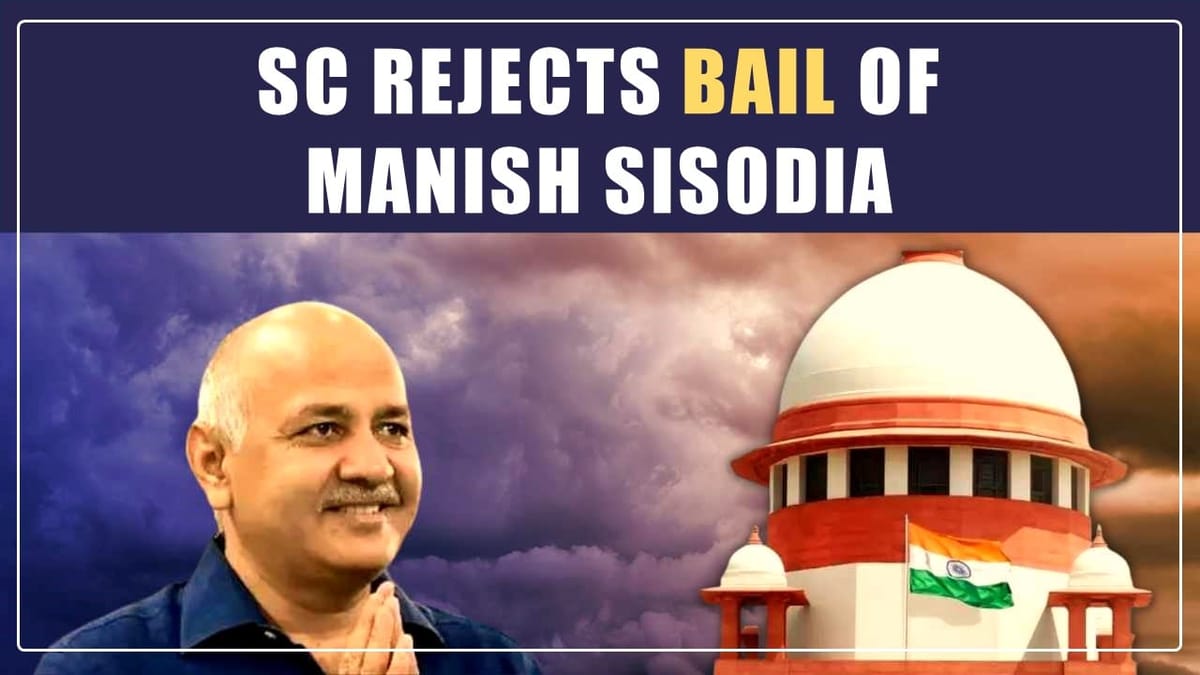Reetu | Oct 31, 2023 |

SC rejects bail of Manish Sisodia in Excise Policy Case involving Liquor
The Supreme Court denied two bail applications filed by Aam Aadmi Party (AAP) leader and former Delhi deputy chief minister Manish Sisodia in a money laundering and corruption case involving the Delhi excise policy.
A bench comprised of justices Sanjiv Khanna and SVN Bhatti refused Sisodia bail, but stated, “An accused’s involvement may be direct or indirect. At first glance, there is a lack of clarity as to the particular accusation of the appellant–Manish Sisodia, direct or indirect–in the transfer of Rs. 45 crore specifically to AAP for the Goa elections.”
The bench noted that there is one clear ground or charge in the complaint filed under the Prevention of Money Laundering Act (PMLA), which is free of perceptible legal challenge, and the facts as alleged are tentatively supported by material and evidence, and this discussion is equally applicable to the charge-sheet filed by the CBI under the Prevention of Corruption Act and IPC.
The bench recited the alleged facts, which established an infraction under Section 3 of the PML Act and the PoC Act: In the ten months that the new excise policy was in effect, wholesale distributors collected Rs. 5.81 crore as a fixed charge. It went on to say that the one-time licence fee paid from 14 wholesale distributors was around Rs. 70 crore, and that under the prior arrangement, wholesale distributors/licensees were entitled to a 5% profit.
Denying bail to Sisodia, the bench stated, “We would like to recapitulate what is stated in the chargesheet filed by the CBI against the appellant” for the sake of clarity, without making any additions, subtractions, or thorough analysis. According to the CBI, the previous excise policy was amended to allow and receive kickbacks and bribes from wholesale distributors by increasing their commission/fee from 5% under the old policy to 12% under the new policy.
“As a result, a plot was devised to carefully draught the new policy, deviating from expert opinion/views in order to create an eco-system that ensures unjust enrichment of wholesale distributors at the expense of the government exchequer or the consumer. The illegal income (proceeds of crime, according to the DoE) would be recycled and returned in the form of bribes,” the bench stated, citing the CBI’s accusation.
The bench stated that it is not inclined to issue bail to Sisodia at this time, considering the CBI’s accusation in the chargesheet. “The excess of 7% commission/fee earned by wholesale distributors of Rs. 338 crore constitutes an offence under Section 7 of the PoC Act, relating to bribery of a public servant.” (According to the DoE, these are criminal proceeds). The wholesale distributors earned this amount in ten months. This figure cannot be refuted or disputed. Thus, the new excise policy was intended to provide windfall advantages to a select few wholesale distributors, who had agreed to offer kickbacks and bribes in exchange,” according to the chargesheet.
The CBI claimed that the policy supported and promoted cartelization, as well as huge wholesale distributors with substantial market share for unrelated reasons, and that kickbacks were guaranteed to make extravagant profits.
In his morning decision, Justice Khanna stated, “In the analysis, we said certain aspects are doubtful, but one aspect about the transfer of money Rs. 338 crore is tentatively established. As a result, we reject the bail application. But we have made one critical remark. They have stated that the experiment will be completed in 6-8 months, or within three months if the trial proceeds slowly. He will be able to file a bail petition.”
According to the CBI chargesheet, which was used by the Supreme Court to deny Sisodia bail, Sisodia was aware that three liquor makers controlled 85% of the liquor market in Delhi, and two of them controlled 65%, while 14 tiny manufacturers controlled 20%.
“According to the new excise policy, each manufacturer could appoint only one wholesale distributor, through whom the spirits would be sold exclusively.” Concurrently, wholesale distributors may enter into distribution agreements with different producers. This facilitated receiving kickbacks or bribes from wholesale distributors with significant market share and turnover,” according to the chargesheet.
The Supreme Court also expressed worry about Sisodia’s protracted detention. In its decision, the bench stated that Section 436A, which governs the maximum time of detention for an undertrial prisoner, should not be interpreted as requiring that an accused not be granted bail under the PML Act until he has served the designated period of confinement. “Detention or incarceration prior to being found guilty of an offence should not become punishment without a trial. If the trial drags on despite the prosecution’s guarantees, and the matter is not resolved within a reasonable time, the bail request may be justified,” the bench said.
While the prosecution may pertain to an economic offence, the bench stated that it may not be appropriate to equate these cases with those punishable with death, life imprisonment, 10 years or more like offences under the Narcotic Drugs and Psychotropic Substances Act, 1985, murder, rape, dacoity, kidnapping for ransom, and mass violence. It further stated that this is not an instance where 100s of depositors have been cheated.
“When the trial is stalled for reasons unrelated to the accused, the court may be compelled to grant bail unless there are compelling reasons. This would be more true when the trial would last years,” the bench stated.
On October 17, the Supreme Court reserved its decision after hearing comprehensive submissions. The Delhi government introduced the liquor policy on November 17, 2021, but it was later repealed at the end of September 2022 due to suspicions of corruption.
In case of any Doubt regarding Membership you can mail us at [email protected]
Join Studycafe's WhatsApp Group or Telegram Channel for Latest Updates on Government Job, Sarkari Naukri, Private Jobs, Income Tax, GST, Companies Act, Judgements and CA, CS, ICWA, and MUCH MORE!"